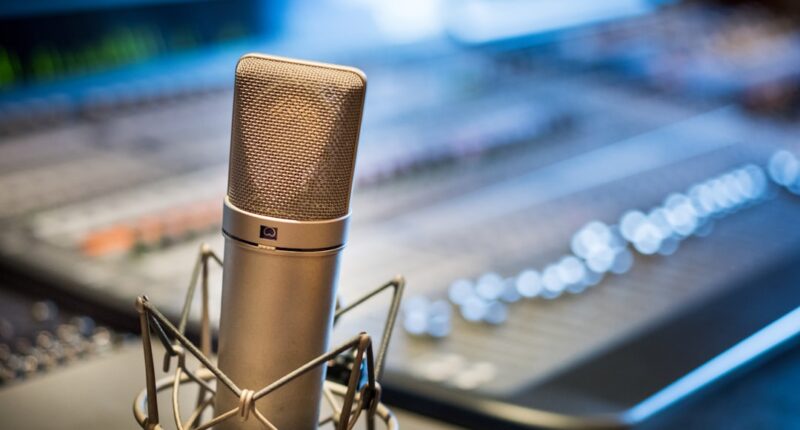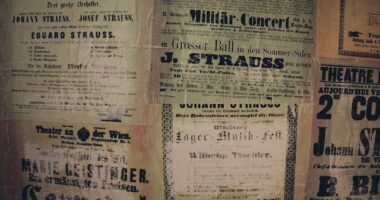Artists are continuously looking for fresh and creative approaches to market their music and engage with fans in the ever-changing music industry. Radio interviews continue to be an essential and productive way to promote music, even in an age where social media and streaming services are formidable instruments for audience outreach. Radio interviews give artists the chance to tell their stories and establish a more personal connection with listeners while also expanding their fan base & increasing exposure.
Key Takeaways
- Radio interviews are an important tool for music promotion.
- Researching the right radio stations and programs is crucial for success.
- Crafting a compelling pitch is key to securing a radio interview.
- Effective communication and delivery are essential for a successful interview.
- Dressing appropriately and choosing the right music can enhance your interview.
Nevertheless, getting a radio interview can be difficult and needs advance planning. We’ll look at how musicians can get radio interviews and use them to their full potential for music promotion in this article. Finding the appropriate radio programs and stations that appeal to your target audience and genre is crucial before contacting them for an interview. You can determine which radio programs & stations are most likely to connect with your music and give you the exposure you want by doing some research on the industry.
Spend some time listening to various stations and shows, observing the music genres they feature and the general atmosphere of the programs. Do some research on the producers and hosts of the shows you are interested in. You can better tailor your pitch and improve your chances of landing an interview by being aware of their preferences, interview style, and the kinds of guests they usually feature.
Gather information about the hosts and producers by using online resources, such as social media profiles and station websites. To get advice & insights, you can also get in touch with people in the industry or other musicians who have appeared in radio interviews. After determining which radio shows and stations would play your music, it’s time to prepare a strong pitch to get an interview. Your pitch should be clear, compelling, and emphasize the special qualities that make you stand out as an artist.
| Radio Interview Tips | Metric |
|---|---|
| Length of Interview | 10-15 minutes |
| Preparation Time | 1-2 hours |
| Key Message | Clear and concise |
| Tone of Voice | Friendly and conversational |
| Body Language | Confident and relaxed |
| Engagement | Active listening and responding |
| Call to Action | Clear and specific |
Make sure the radio station is interested in you and believes you would be a valuable guest by highlighting your music, story, and personality. For every radio program & station you are targeting, tailor your pitch. Tell them why you think your music would fit in and add personal anecdotes or references to particular shows or interviews that spoke to you. Your pitch will be more memorable if you can demonstrate that you have done your homework and that you sincerely value the radio station’s efforts. It is crucial to get ready for the radio interview after you have managed to land one.
Making an impact on listeners that lasts requires effective communication and delivery. In order to deliver a confident and captivating speech, practice your delivery and speaking abilities. Try recording your practice sessions so you can see where you need to make adjustments and improve the way you deliver the material. Get talking points and stories ready to ensure that the conversation stays on topic. Consider how you can connect the main points you want to make in the interview with engaging anecdotes or experiences.
Keeping yourself on course and maximizing your airtime will be made easier by doing this. During the interview, be aware of the time constraints. Radio interviews frequently have a time limit, so it’s critical to stick to the subject and refrain from digressing. Make the most of your time by practicing providing succinct & meaningful responses. You should still dress appropriately for the occasion even though radio interviews are primarily audio-based.
While selecting your attire, take the radio station’s culture and fashion sense into account. If the station has a more formal or businesslike vibe, go for a well-groomed appearance. Conversely, you can wear something that expresses your own style and still looks professional if the station has a more laid-back or alternative vibe. Keep your performance from being impacted by garish or uncomfortable clothing.
In order to concentrate on giving a fantastic interview, dress in a way that makes you feel good about yourself. Wearing clothes that fits with how you want to be perceived as an artist is important to keep in mind since it contributes to your personal brand and image. Your interview revolves around music, so it’s critical that you select songs that both suit the format and listenership of the radio station and highlight your talent. Choose songs that best capture your distinct sound & style and will appeal to the radio station’s listeners. When choosing songs, take the station’s general vibe and genre into account.
Give background information & context for the songs you choose to play during the interview. Tell us about the songs’ inspirations, any fascinating behind-the-scenes stories, any noteworthy collaborations or accomplishments, & any other relevant information. This will improve the listening experience and strengthen the bond between your music & your followers.
Make a lasting impression by using music as a tool to support your message. Make sure to highlight any songs that are relevant to the themes or topics you will be discussing during the interview and provide an explanation if there are any specific ones. This will make it easier for listeners to recall your music and connect it to the interaction they had with you. Using social media to promote your radio interview and create buzz among your fans and followers is a great strategy in the current digital era.
Announce and promote your impending interview on social media. Make interesting posts that draw attention to the time, date, and radio station & entice your followers to listen in. Before the interview, send out behind-the-scenes pictures and videos to spark interest & excitement. Follow your followers along by sharing with them glimpses of your interview preparation or an overview of what to expect from the interview.
They will be more excited for the interview and feel more connected to you as a result. Encourage listeners to tune in and join the conversation using mentions & hashtags during the interview. Engaging your audience and fostering a sense of community can be achieved by doing this. Share the interview’s highlights or brief segments on your social media channels after it’s over to increase its visibility & give people who missed it a chance to catch up. It is crucial to send a thank-you note to the radio station and the host after the interview.
Thank you for the chance to be interviewed, and mention any good experiences or compliments you got from listeners. This will demonstrate your professionalism, make a lasting impression on the radio station, & raise the possibility of further opportunities. To make the most of the interview, keep spreading the word about it on your channels and on social media. Provide links to the interview’s recording as well as any articles or blog posts that mention it.
After listening to the interview, ask your fans and followers to comment and share their opinions. This continuous promotion will support the interview’s outreach and sustain its momentum. Make the most of your interview by using it as a launchpad for more projects & alliances. When contacting other radio stations or business associates, mention the interview in your bio or press kit and cite it as a source. The interview can lead to new opportunities & collaborative projects in addition to serving as a confirmation of your talent. Your chances of landing radio interviews and other music promotion opportunities can be substantially increased by making connections with radio professionals and industry experts.
Find and connect with people who can offer direction and advice on how to enhance your performance, pitch, and promotion tactics by using directories for music professionals. Speak with experts in the field & get their opinions on your music and marketing collateral. Inquire about their suggestions for particular contacts or opportunities, as well as advice on how to approach radio stations and shows. Creating networks and relationships in the industry can open doors for future radio opportunities and career advancement. It’s critical to create a thorough marketing strategy that makes the most of your radio interview in order to optimize its impact.
To reach a larger audience & create buzz about the interview, think about utilizing email marketing. Highlight the interview in a newsletter or special email that you send to your mailing list, urging them to subscribe. Press release about the interview should be well written & sent to appropriate media sites & business associates. This will assist in gaining more publicity & coverage for your interview. If you’d like to have an article or interview about your radio appearance featured, think about contacting online publications, magazines, and music blogs.
To improve your results and strategy, measure and analyze the results of your promotion efforts. As you post content on social media, keep an eye on its interaction and reach, track website traffic & conversions, get audience feedback, & keep an eye on streaming services. You can use this information to better understand what went well and what needs to be improved for upcoming radio appearances and music marketing initiatives. Radio interviews are, all things considered, a useful and successful marketing tool for music.
Artists can utilize radio interviews to their full potential and expand their audience by researching appropriate radio stations and programs, creating a strong pitch, getting ready for the interview, using social media wisely, and strategically following up. Radio interviews can be an effective stepping stone to success in the music business if they are carefully planned and prepared for.
If you’re an aspiring musician looking to get your music on the radio, you’ll definitely want to check out this informative article on Music Marketing Blog. This blog is a treasure trove of valuable insights and tips for musicians, and their recent post titled “How to Get on Radio: A Step-by-Step Guide” is a must-read. Whether you’re a beginner or an experienced artist, this article provides practical advice and strategies to help you navigate the complex world of radio promotion. Don’t miss out on this opportunity to learn from the experts! Click here to read the full article and take your music career to new heights.
FAQs
What is radio?
Radio is a form of communication that uses electromagnetic waves to transmit sound and information from one place to another.
Why should I try to get on radio?
Getting on radio can help you reach a wider audience and promote your message, product, or service. It can also help you establish yourself as an expert in your field.
What are the different types of radio stations?
There are several types of radio stations, including commercial stations, public radio stations, college radio stations, and internet radio stations.
How do I find radio stations to pitch to?
You can use online directories, such as Radio-Locator or TuneIn, to find radio stations in your area or in your target audience’s area. You can also search for radio stations on social media platforms or use a media database service.
What should I include in my pitch to radio stations?
Your pitch should include a brief introduction of yourself or your organization, a summary of your message or product, and why it would be of interest to the radio station’s audience. You should also include any relevant media or press materials.
How can I increase my chances of getting on radio?
You can increase your chances of getting on radio by doing research on the radio station and its audience, tailoring your pitch to the station’s format and audience, and following up with the station after you’ve sent your pitch. Building relationships with radio hosts and producers can also help increase your chances of getting on air.









